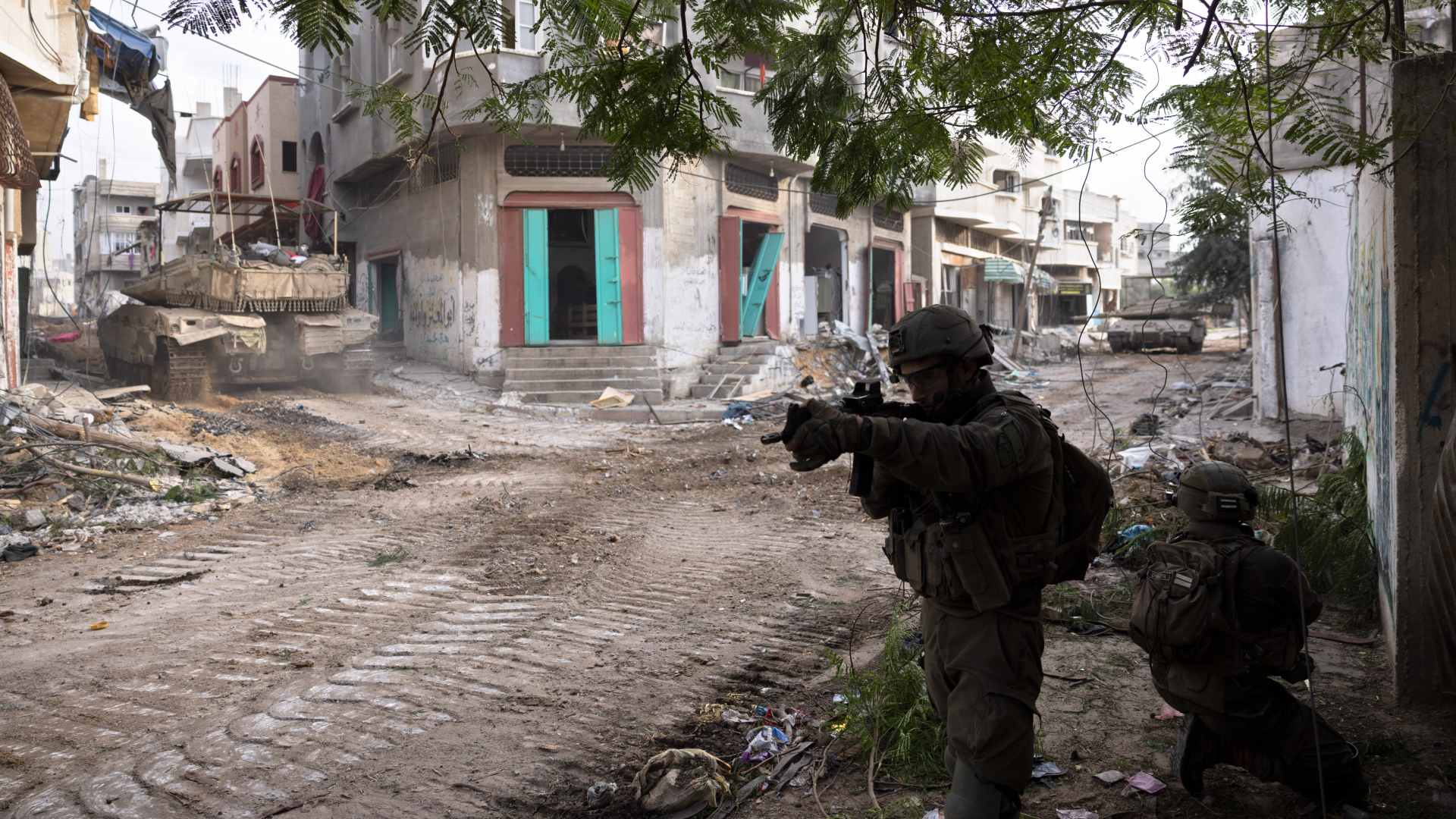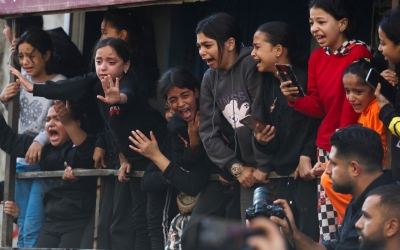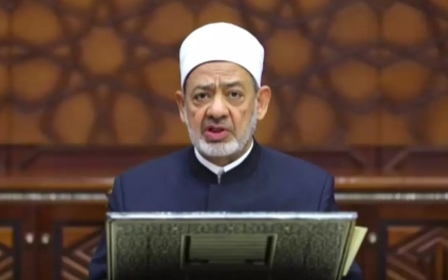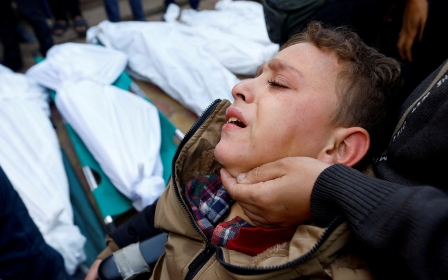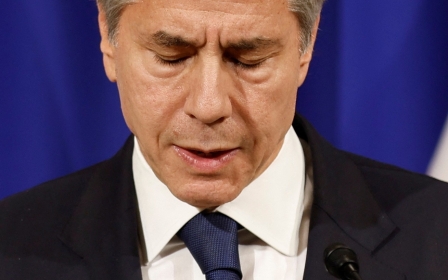Israel-Palestine war: Hamas denies its battalions have been significantly degraded
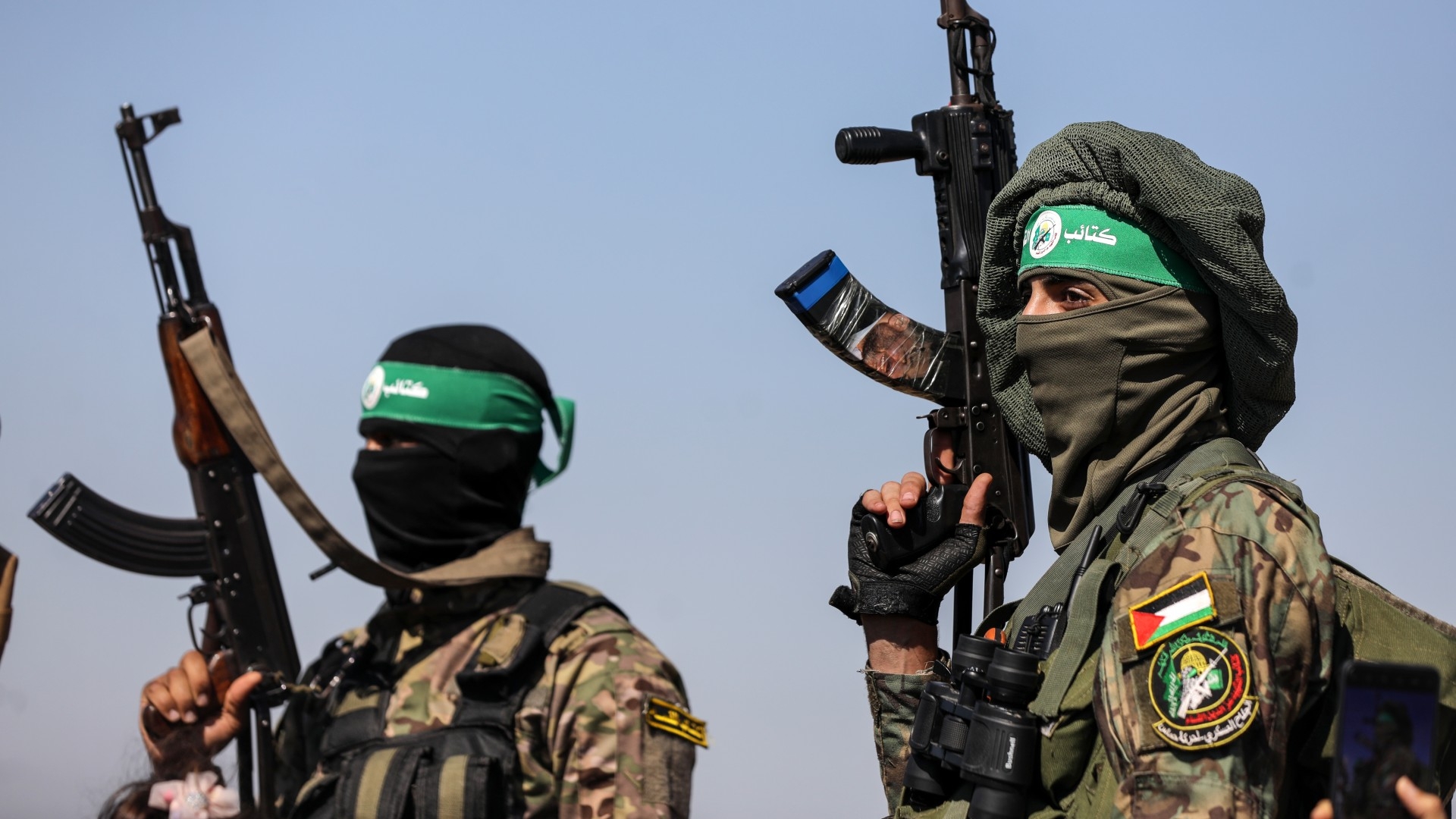
Senior Hamas members have denied reports that the group's Gaza battalions have been significantly degraded, days after the Israeli military said five influential Hamas commanders had been killed.
Last week, Israel's military released an annotated photo that it said included the names and faces of recently slain Hamas commanders who led battalions and brigades in northern Gaza.
The Qassam Brigades, the military wing of Hamas, confirmed that at least three of the men had been killed, including Ahmed al-Ghandour, the head of its northern brigade.
Israel has since claimed that up to 5,000 fighters, out of a total of 30,000 from the Qassam Brigades, have been killed in the past two months of fighting.
A Palestinian source, close to Hamas's political leadership in exile, rubbished the Israeli military's latest figures, telling Middle East Eye that the number of casualties among Qassam fighters was "very low".
New MEE newsletter: Jerusalem Dispatch
Sign up to get the latest insights and analysis on Israel-Palestine, alongside Turkey Unpacked and other MEE newsletters
When pressed for a number, the source said that the "total number of casualties is below 10 percent".
'In a small arms battle Hamas can inflict casualties... but close-range fighting is not enough for Hamas to achieve a victorious outcome'
- Murat Aslan, SETA
"Qassam is a military movement with a centralised structure and a loose organisational ring. We have not heard that the central forces have suffered serious casualties, except for some commanders who were outside the tunnels because of the fighting," he said.
The source's comments came days after Israeli forces arrested scores of Palestinian civilians sheltering near two UN-run schools in Beit Lahia in the northern Gaza Strip.
The Israeli army has repeatedly claimed, without providing evidence, that between 10-15 percent of the arrested men belonged to Hamas.
MEE has obtained a list of the names, ages, and professions of many of those who were detained. Some are academics, journalists, teachers at UN-run schools, school students, blue-collar workers, and employees with the Palestinian Authority.
Follow Middle East Eye's live coverage for the latest on the Israel-Palestine war
Murat Aslan, an assistant professor at Hasan Kalyoncu University and an analyst at the Ankara-based SETA think tank, said that while it was unclear whether Qassam had suffered major losses so far, moving forward, the odds were firmly stacked against the Palestinian group.
"Israel has the luxury of mobilising US support and its own resources and using time as a force multiplier," Aslan told MEE.
"Israel has effectively used air, drone and fire support assets and Hamas lacks the air defences to intercept them.
"In a small arms battle, of course, Hamas can inflict casualties - especially in close combat. But close-range fighting is not enough for Hamas to achieve a victorious outcome. On the other hand, Israel has the advantage of being able to retreat, soften the ground, and launch another ground operation," he added.
Guerrilla war
Israeli leaders have sworn to crush Hamas after the Palestinian group attacked southern Israel on 7 October, killing 1,200 people. Most of those who died were civilians, and included children and elderly Israelis, as well as dozens of foreign workers.
Since then, an Israeli offensive has wrought massive destruction across Gaza, displacing most of the embattled territory's 2.3m population. At least 18,000 Palestinians have been killed, among whom around 70 percent are women and children.
Israel has said it has killed two Palestinian civilians for every Hamas fighter, a ratio an Israeli army spokesperson has described as "tremendously positive". However, more civilians have died in the ongoing war than in any of Israel's past conflicts with Hamas.
During Israel's 50-day assault on Gaza in 2014, 2,251 Palestinians were killed, of whom 1,462 were believed to be civilians, according to the United Nations.
Since Israel launched its ground invasion of Gaza on 28 October, Hamas has used above-ground ambushes and quick strikes against Israeli tanks, military vehicles and patrols, killing at least 105 Israeli soldiers.
Abu Obeida, a spokesman for the Qassam Brigades, said on Sunday that the group's fighters had completely destroyed or damaged 180 Israeli military vehicles in the first 10 days after the truce with Israel ended on 1 December. MEE could not independently verify the figure.
Another Palestinian source close to Hamas, who fought with the group until 2021 when he sustained an injury, told MEE that Qassam fighters were engaged in urban fighting reminiscent of the house-to-house fighting seen in the Iraqi city of Fallujah in 2004 following the US-led invasion.
"What is happening now in Gaza is a kind of guerrilla war," the source said.
"It is unnecessary and risky to mobilise a force of thousands for this war. For hit-and-run operations, fast, few-man teams are enough. These teams are also very small in terms of targets and minimise casualties," the source added.
According to analysts, Hamas has grown stronger since 2008, when it first faced an Israeli ground assault. Back then, the Qassam Brigades fielded 16,000 fighters alongside 2,000 dedicated combat troops. Now, according to the Israeli army, it has amassed as many as 30,000 fighters and boasts an arsenal of drones and rockets.
Hamas has smuggled in components to convert dumb rockets into guided precision weapons, and even built an underwater drone.
The group also makes its own shoulder-fired anti-aircraft missiles, which it says can take out Israeli helicopters, and anti-tank rockets.
Rich Outzen, a retired US colonel and nonresident senior fellow at the Atlantic Council, told MEE that targeting Hamas' underground labyrinth of tunnels could be part of Israel's next phase of action.
Since the early 2000s, Hamas has been using a vast web of fortified tunnels to help fighters melt away after staging military parades or attacks against Israel.
"Israel can make the tunnels difficult to use by carrying out raids, blowing the openings and exits, perhaps flooding portions - but it probably lacks the appetite to clear each and every one," he said.
"But by degrading, harassing, and partially destroying the tunnels, they can make them very hard to use and thus reduce the overall effectiveness of the tunnel network."
'Bereft of political or territorial control'
Since the latest truce elapsed on 1 December, Israeli officials have directed their attention on Khan Younis and its refugee camp, which was founded to shelter Palestinians displaced in 1948 following the creation of Israel.
Two of Hamas's top leaders, Yahya Sinwar and Mohammed Deif, were born in the camp, and for weeks, Israel has claimed that the men could be hiding there.
In recent days, Israeli forces have reportedly surrounded Sinwar's home in Khan Younis. Israel previously claimed he was sheltering in Gaza City.
While Hamas's leadership in normal times makes decisions based on consensus, Israeli officials believe Sinwar is directing the course of the war.
'A weakened or shrunken Hamas looks a lot like weakened and shrunken ISIL'
- Rich Outzen, retired US colonel
Despite the fighting being far from over, Israeli Prime Minister Benjamin Netanyahu has already began planning for the day after the war concludes, and has vowed that the Palestinian Authority would not be allowed to rule the strip.
Palestinian Prime Minister Mohammad Shtayyeh told Bloomberg last week that the preferred outcome of the conflict would be for Hamas to become a junior partner under the Palestinian Liberation Organisation (PLO), helping to build a new independent state that includes the West Bank, Gaza and East Jerusalem.
"If they [Hamas] are ready to come to an agreement and accept the political platform of the PLO, then there will be room for talk. Palestinians should not be divided," Shtayyeh said, adding that Israel's aim to fully defeat Hamas is unrealistic.
The Biden administration has supported Israel's goal of eliminating Hamas, but insists that the Palestinian Authority (PA) can eventually fill the vacuum in order to reunite the West Bank and Gaza under a single political entity.
However, the US has conceded that the PA will need to be "revitalised" before it can take responsibility for the Gaza Strip.
Asked if this means that PA President Mahmoud Abbas would have to step down, US Deputy National Security Adviser Jon Finer told the Aspen Security Forum: "Not necessarily."
Netanyahu has on several occasions rebuffed the notion of the PA running Gaza after the war ends, and on Friday dismissed Shtayyeh's remarks.
'We reject the participation of any international or Arab forces in the administration of Gaza'
- Khaled Meshaal, former Hamas leader
"There will not be a Hamas - we will destroy them," he said, adding that "the fact that this is the suggestion of the Palestinian Authority only strengthens my policy that the PA is not the solution".
Meanwhile, former Hamas leader Khaled Meshaal has already ruled out the idea that international or forces from Arab states could administer the Gaza Strip.
"We reject the participation of any international or Arab forces in the administration of Gaza," he told Hamas members late last month.
"All these plans will be trampled upon by our heroes in the resistance, led by our victorious brigades, the Qassam Brigades," he added after dismissing discussions taking place between the US and Israel over a post-Hamas world.
For Outzen, an eventual Hamas defeat is inevitable, and the retired colonel suggested the group could face a similar fate as the Islamic State militant group which was dislodged by a relentless military campaign from large areas of Syria and Iraq where it had seized control.
Hamas would be "weakened and shrunken", he said, still capable of conducting isolated attacks but "damaged as a brand, bereft of political or territorial control, and marginal in its kinetic threat".
Middle East Eye delivers independent and unrivalled coverage and analysis of the Middle East, North Africa and beyond. To learn more about republishing this content and the associated fees, please fill out this form. More about MEE can be found here.


